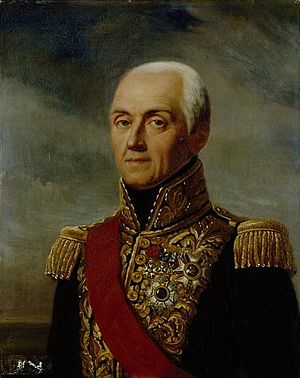Guillaume-Mathieu Dumas facts for kids
Quick facts for kids
Mathieu Dumas
|
|
|---|---|

Portrait by Louise Adélaïde Desnos, 1842
|
|
| Born | 23 November 1753 Montpellier, France |
| Died | 16 October 1837 (aged 83) Paris, France |
| Allegiance | |
| Years of service | 1780–1815 |
| Rank | General of Division |
| Battles/wars | American Revolutionary War, French Revolutionary Wars, Napoleonic Wars |
| Awards | Name inscribed under the Arc de Triomphe, |
| Other work | Peer of France, Member of the council of state, Author of military memoirs |
Mathieu Dumas (born November 23, 1753 – died October 16, 1837) was an important French general and politician. He lived during a very exciting time in French history. This included the French Revolution and the Napoleonic Wars.
Contents
Early Life and Military Career
Mathieu Dumas was born in Montpellier, France. He came from a noble family. He joined the French army in 1773. By 1780, he was working as an aide-de-camp. This means he was a personal assistant to General Rochambeau.
Dumas helped Rochambeau during the American Revolutionary War. He took part in many important battles for almost two years. When the war ended in 1783, he returned to France as a major.
From 1784 to 1786, Dumas explored the islands and coasts of Turkey. In 1787, he was at the siege of Amsterdam. Here, he worked with the Dutch army against the Prussians.
Role in the French Revolution
When the French Revolution began in 1789, Dumas supported Lafayette. Lafayette was a leader of the constitutional liberal party. The National Constituent Assembly gave Dumas an important job. He commanded the escort that took King Louis XVI to Paris. This happened after the king tried to escape in June 1791.
In 1791, Dumas became a maréchal de camp (a type of general). He was put in charge of troops in Metz. He did a great job improving the soldiers' discipline there.
Political Changes and Exile
Dumas was chosen to be a member of the Legislative Assembly in 1791. He became the president of the Assembly in 1792. However, extreme republicans gained power. Dumas decided it was safer to escape to England.
He returned to Paris soon after. He was worried his father-in-law would be blamed for his absence. But when he arrived, the Reign of Terror was happening. This was a very dangerous time. Dumas had to flee again, this time to Switzerland.
After a while, he returned to France. He was elected to the Council of Ancients. This was a part of the government during the Directory period. But in 1797, he was seen as a supporter of the monarchy. He had to escape again, to Holstein. There, he started writing his military memoirs.
Service Under Napoleon
When Bonaparte became the First Consul in 1799, Dumas was called back to France. He helped organize the "Army of Reserve" in Dijon. In 1805, he became a councillor of state.
Dumas served well at the Battle of Austerlitz in 1805. In 1806, he went to Naples. There, he became the minister of war for Joseph Bonaparte, Napoleon's brother.
When Joseph became King of Spain in 1808, Dumas rejoined the French army. He served in Spain in 1808 and in Germany in 1809. After the Battle of Wagram in 1809, Dumas helped negotiate a peace agreement with Austria.
Later Military Roles
In 1810, Dumas received two important honors. He became a grand officer of the Legion of Honour. He also became a count of the Empire.
During the Russian campaign of 1812, he was the intendant-general of the army. This meant he was in charge of all the army's supplies and administration. The difficult retreat from Moscow made him very ill.
After he recovered, he continued his duties as intendant-general. He took part in battles in 1813. He was captured after the surrender of Dresden.
Post-Napoleonic Era and Later Life
When Louis XVIII became king in 1814, Dumas helped him with army administration. When Napoleon Bonaparte returned from Elba during the Hundred Days in 1815, Dumas first stayed out of public life. However, Joseph Bonaparte convinced him to meet Napoleon. Napoleon then asked him to help organize the National Guard.
After Louis XVIII returned to power in 1815, Dumas had to retire. He spent his time writing more of his military history book, Précis des événements militaires. He published nineteen volumes between 1817 and 1826. These books covered the history of the war from 1798 to 1807.
Dumas's eyesight grew weaker and he eventually became blind. This stopped him from writing more of his own work. But he translated Napier's Peninsular War as a continuation.
In 1818, Dumas was back in favor. He became a member of the council of state again. But he was removed in 1822. After the July Revolution of 1830, in which he played an active part, Dumas was made a peer of France. This meant he became a member of the French nobility with special privileges. He also rejoined the council of state.
Mathieu Dumas died in Paris on October 16, 1837. His military memoirs are a valuable source for understanding that time in history. His son published his Souvenirs du lieutenant-général Comte Mathieu Dumas after his death in 1839.
Images for kids
 | William L. Dawson |
 | W. E. B. Du Bois |
 | Harry Belafonte |


